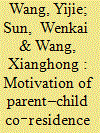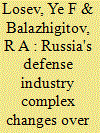| Srl | Item |
| 1 |
ID:
159044


|
|
|
|
|
| Summary/Abstract |
This article evaluates pension differentials between the private and public sectors over the lifecycle in urban areas in China. The aim of this study was to examine social equity in the face of increasing pressures to reform the current pension system. We developed a model to measure the protection and incentives offered by pensions in the private and public sectors. By incorporating educational cost, career length, retirement age, average years that a retiree receives the pension after retirement, growth rate of wages, interest rates and pension benefits into the model, we provided actuarial assessments. This study found that the current institutional arrangement of pensions in China results in negative incentives for workers in the public sector.
|
|
|
|
|
|
|
|
|
|
|
|
|
|
|
|
| 2 |
ID:
101395


|
|
|
|
|
| Publication |
2011.
|
| Summary/Abstract |
A common assumption in lifecycle assessment (LCA) based estimates of greenhouse gas (GHG) benefits (or costs) of renewable fuel such as biofuel is that it simply replaces an energy-equivalent amount of fossil fuel and that total fuel consumption remains unchanged. However, the adoption of renewable fuels will affect the price of fuel and therefore affect total fuel consumption which, may increase or decrease depending on the policy regime and market conditions. Using a representative two-region model of the global oil market in which, one region implements a domestic biofuel mandate and the other does not, we show that the net change in global fuel consumption due to the policy, which we term indirect fuel use change (IFUC), can have a significant impact on the net GHG emissions associated with biofuel. If LCA-based regulations are designed to account for indirect emissions such as indirect land use change, then we argue that IFUC emissions cannot be ignored. Our work also shows how different policies can affect the environmental impact from adopting a given clean technology differently.
|
|
|
|
|
|
|
|
|
|
|
|
|
|
|
|
| 3 |
ID:
164727


|
|
|
|
|
| Summary/Abstract |
This paper examines the motivations of parent‐child co‐residence behavior in China using data from the China Health and Retirement Longitudinal Study. We test three possible motives: social norms, self‐interest and altruism. We find that social norms play an important role in household co‐residence behavior, showing that the belief that “sons take care of parents” is strong, and children in different birth orders take different responsibilities. Taking the one‐child policy as a natural experiment, we compared co‐residence behavior between only‐child and multi‐child families. This allowed us to test whether children in multi‐child families with wealthier parents more often co‐reside in order to compete for a bequest. We find that parents' wealth is more appealing to children in multi‐child families. The results support the life cycle theory that co‐residence decisions are motivated by self‐interest. We also find some evidence of altruism when parents and children make co‐residence decisions. These findings provide some insights for designing future elder‐support policies in China.
|
|
|
|
|
|
|
|
|
|
|
|
|
|
|
|
| 4 |
ID:
138197


|
|
|
|
|
| Summary/Abstract |
The authors examine the current condition and problems the Russian defense industry complex faces as it makes a transition to contracts spanning the lifecycle of high-tech military products, and provide an overview of the experience Western countries have gained in implementing the maintenance service support concept for manufactured products. They offer conceptual approaches to the development and introduction of CALS technologies in after-sales maintenance services for arms and military equipment.
|
|
|
|
|
|
|
|
|
|
|
|
|
|
|
|